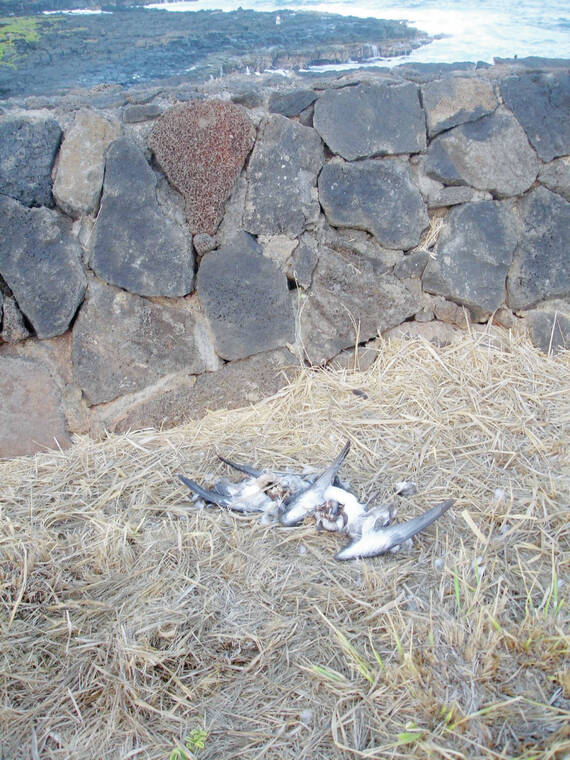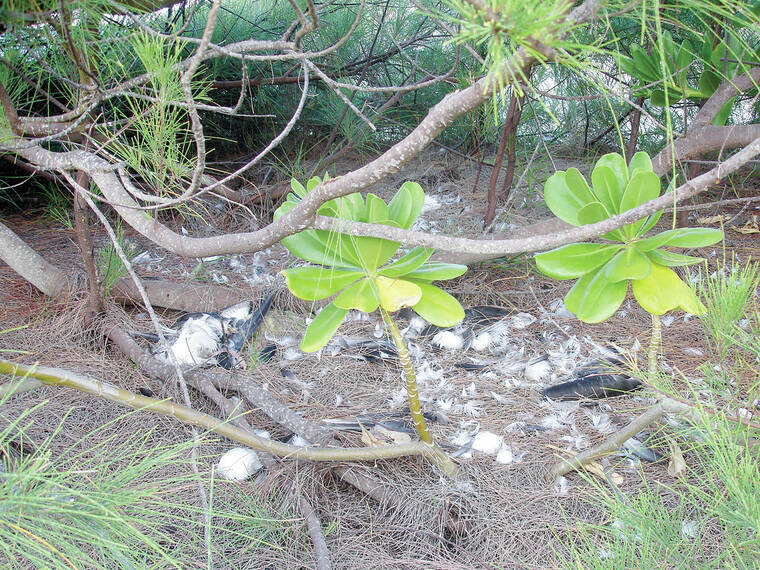PO‘IPU — The state Department of Land and Natural Resources Division of Forestry and Wildlife will meet with property owners following ongoing reports of feral cats wiping out a wedge-tailed shearwater colony on Makahu‘ena Point in Po‘ipu.
‘Oma‘o resident Kerin Lilleeng began walking the public footpath through the colony, which spans The Point at Po‘ipu Resort and Makahu‘ena Estates, in March 2020. Since then, Lilleeng and other frequent visitors have documented at least 100 seabirds killed by cats, calling on government officials and landowners to address the issue.
But Lilleeng claims her efforts have lead nowhere in the past year.
“I feel everybody should be working together,” she said. “All property owners should be held accountable for the bird-nesting sites on their property.”
Makahu‘ena Estates — currently a grassy space framed by a rock wall — is required to avoid disturbing existing wedge-tail nesting sites, make certain adjustments to the rock wall to allow for seabird egress, and work with DOFAW to restore the shearwaters’ coastal habitat, as conditions of a county Special Management Area permit.
Lilleeng, a horticulturalist, says those obligations have not been satisfactorily met, pointing to continued deaths and a lack of indigenous plants. She and others say shearwaters (“‘ua‘u kani” in Hawaiian) land behind the estates’ rock wall and are killed before they can escape, despite ground-level tubes placed in the wall for birds’ passage.
The Kaua‘i Planning Department, prompted by Lilleeng, conducted an on-site inspection of the Makahu‘ena Estates wall and vegetation in July.
The department sent its findings to the DNLR, the body behind the SMA permit’s shearwater-specific conditions, and is now working with the state “regarding any concerns they may have,” a county spokesperson confirmed.
Makahu‘ena Estates Project Manager David Weekes said animal-control specialists are on the property daily, and native naupaka shrubland has been established and is being used by nesting shearwaters.
Weekes also noted the estates and DOFAW have each installed informational signs along the footpath, alerting users to the wedge-tailed shearwater colony.
Weekes described the estates lots as a historically disrupted area, repeatedly bulldozed and rebuilt for over a century.
Concrete rubble and litter rendered the place a “wasteland” in the early 2000s.
“One biologist called the site a ‘biological sink,’ meaning few if any shearwater chicks survived to fledge and fly to sea,” Weekes said.
Weekes agreed predation by cats and loose dogs remains a serious challenge today, but claimed landowners’ conservation efforts have been stymied by tampering and disregard for posted warnings.
“We understand there are people in the neighborhood who feed feral cats, constantly increasing the pressure on birds,” Weekes explained. “We have also seen on camera individuals releasing trapped cats and interfering with the traps.”
DOFAW has partnered with local property owners to remove more than 50 feral cats and disseminate flyers reminding the public to keep pets indoors, kenneled or leashed, the division said in a written statement.
“The Association of Owners of Makahu‘ena Estates, which recently purchased the property earlier this year, is setting up a meeting with DOFAW to discuss ways to better protect the seabirds and their habitat,” DOFAW said.
The Point at Poʻipu, which does not hold any permits with shearwater-related conditions, has not installed signage. The resort did not respond to requests for comment.
Footpath users remain frustrated. They say the state and hotels have shirked responsibility, and time is running out to make things right.
Ron Botier walks the path once a day. He’s been coming to the colony for the past 20 years and expresses deep admiration for the wedge-tails. He claims the birds’ population has dropped significantly in recent years.
“They’re very handsome birds. (To) watch their flight is very nice, very remarkable. It’s nature at its best,” he said. “We just got a situation going on here and it’s dead in the water.”
Conservation experts say seabird predation by cats and occasional dogs at Makahuena Point is the most-visible example of an island-wide problem. It’s compounded in Poʻipu by wedge-tails’ prevalence on Kaua‘i, according to one.
“It’s one of those situations where if we don’t look after them and protect them, eventually we’ll end up with a situation where the colonies are getting extirpated and they’re not here anymore,” Helen Raine of Archipelago Research and Conservation said.
Makaheuna Estates, DOFAW and residents all say the wedge-tailed shearwaters are at risk.
“Everybody has to step it up a little bit more,” Lilleeng said. “The hotels, DOFAW, everybody that is in charge of taking care of that bird-nesting site has to step up and do their job. In the meantime, the birds are dying.”
This particular species of shearwater is considered neither endangered nor threatened.
•••
Scott Yunker, general assignment reporter, can be reached at 245-0437 or syunker@thegardenisland.com.




Time for DLNR to start offering a bounty on every feral cat carcass brought in.
We dump poison all over Lehua to erradicate rats who endangered protected seabirds. I don’t understand why feral cats get treated differently or why we let a small number of irrational cat lovers dictate policy.
All feral cats on the island should be trapped or killed. The practice of neutering and then releasing cats is insane — we are risking historical losses or extinctions of our native birds over some house cats that idiot humans let go. I love cats and all other animals, but this is just crazy — get rid of all of the cats once and for all. Anyone killing a loose cat — including free-roaming pets — should be considered a hero for protecting the birds.
the loudest group will get the grease, feral cat lovers or conservationists, so far the endangered species is losing, government is afraid of the vocal minority of feral cat lovers so the birds will be lost forever. time to speak up! breaking news: spayed and neutered cats can kill birds,